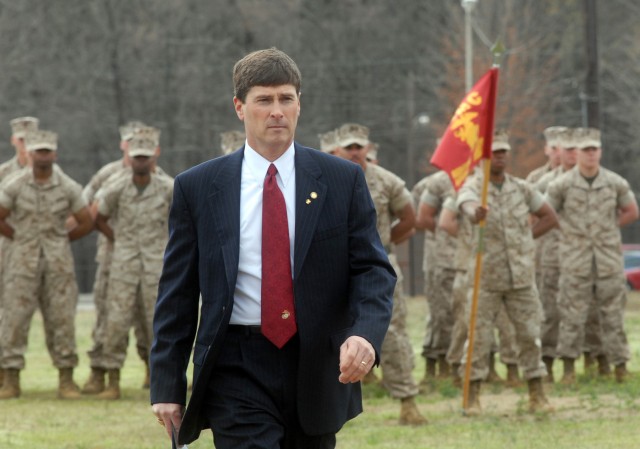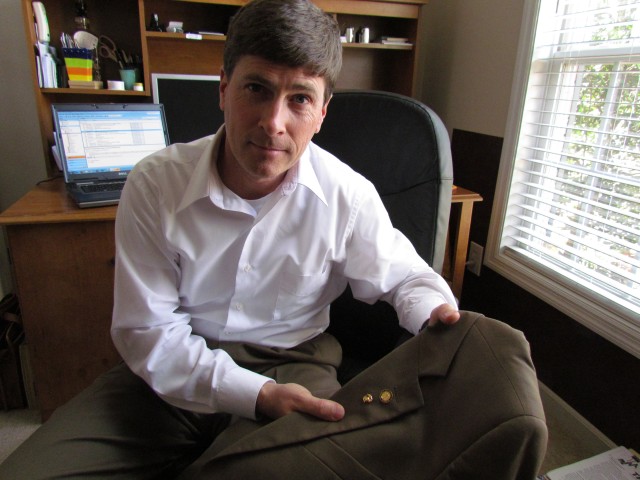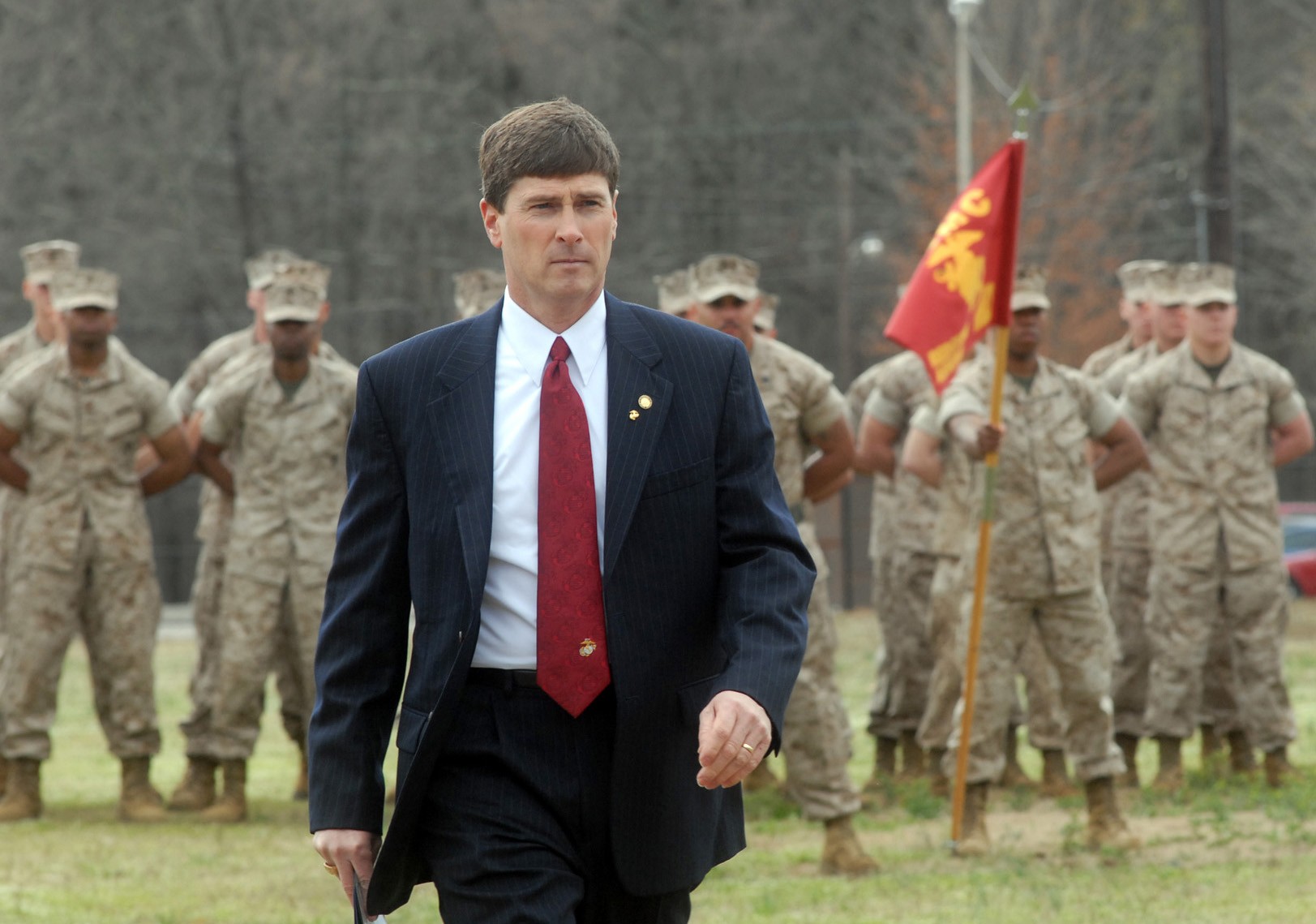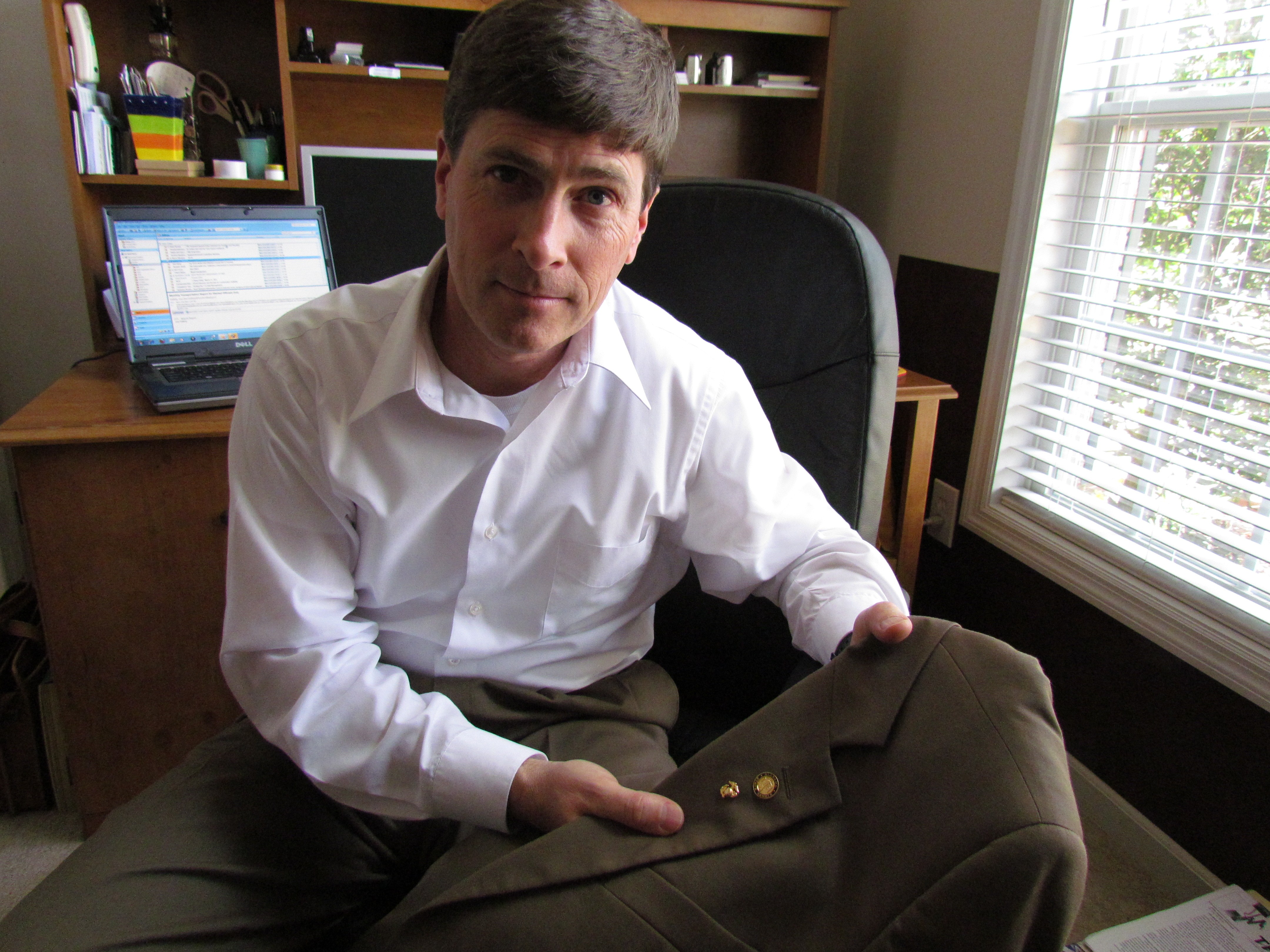REDSTONE ARSENAL, Ala.--There are a lot of connections that bring recently elected District 2 state Sen. Bill Holtzclaw back to Redstone Arsenal.
Holtzclaw, a retired Marine war veteran, was introduced to Redstone twice during his military career -- first in 1983 as a private who came here for ammunition specialist training at the Ordnance Munitions and Electronics Maintenance School and, second, in 1999 as the officer-in-charge of the Marine Corps Detachment.
It was the second assignment that worked its charm on Holtzclaw and his family, including wife Pam and two daughters, one now in college and the other attending Madison City Schools.
"In reality, that first time was kind of a blur because of the time frame. I was young and concerned about learning about my career in the Marines. I rarely left the base as a young Marine at Redstone," he recalled.
During the course of a Marine career that took him to Operation Desert Storm in 1991 and Operation Restore Hope in Mogadishu, Somalia in 1992, Holtzclaw kept Redstone in mind, remembering the sense of community that he felt even as a fast-paced, nose-to-the-grindstone private. Whenever he had the chance, he would request an assignment to be an instructor of Marines at Redstone.
"It was a coveted assignment," he said. "It was a good career enhancer and also a unique assignment. "
He was a chief warrant officer 2 when the officer-in-charge at the Marine Corps Detachment had a medical issue that forced him to retire. Holtzclaw was tapped to take his place.
"Through patience and God's timing, I got here as the officer-in-charge," he said. "I came in with a lot of energy and a lot of ideas."
Holtzclaw will tell anyone that it was the Marines that made him the kind of man he could be proud of.
"I lived in Arkansas for 18 years. But I grew up in the Marine Corps. During three months in boot camp, I learned discipline, drive, how to focus on being patient, how to set short term goals to get to long term goals," he said. "The Marine Corps was made for me and I was made for the Marine Corps."
As a senior in high school, a friend asked him to attend a Marine recruiting event. Holtzclaw declined, saying "Marines are insane. There's no way I would join the Marine Corps."
Instead he entered college. But that didn't work out and in December 1982 Holtzclaw was working as a cook in a restaurant.
"Two other guys I knew from high school came in dressed in their Marine Corps blues. They were looking for me," Holtzclaw recalled. "I knew if they could do it, I could do it, too. I stood up a date with my future wife that night to join the Marines."
At 120 pounds and 5-foot-8, Holtzclaw did have some doubts of whether he could handle the physical demands of Marine boot camp. But, instead, he excelled, and added 40 pounds of muscle to his frame before graduating.
"You never know what you are made of until you challenge yourself and step out there," he said.
A Marine career gave Holtzclaw plenty of opportunities to challenge himself, including two wartime deployments. He served in Operation Desert Storm in support of the 1st Marine Division.
"That was low intensity, low conflict in the grand scheme of things," he said. "We went to Kuwait City and I re-enlisted at the U.S. embassy. The biggest thing we saw was planes flying overhead."
His experience was totally different during Operation Restore Hope in support of the 3rd Light Infantry Battalion.
"The Marines are a contingency force. We went in (to Mogadishu, Somalia) during a United Nations operation," Holtzclaw said. "On Dec. 9 (1992) we went ashore in eight-wheeled fast-attack vehicles to secure the airfield. I was the battalion ammunition chief for three companies in theater."
As the Marines grew their footprint, they moved from the airport to a soccer stadium, and secured city streets. Once the flow of UN forces moved in and saturated the city, the Marines moved out to secure the country and their mission was over.
"We pulled out in April (1993) before Black Hawk Down (the term used to describe a major battle in October 1993 on which a major motion picture is based). The bad guys realized they didn't want to take on the Marines and so they went underground. We didn't realize at the time that it was a hotbed for terrorist activity. Looking back, I wish we had done more," he said.
"But we did establish a beach head, an airport, a base of operations. We patrolled the streets and we were involved in sprints of heavy action that were swift and brutal. That's where I earned my combat action ribbon."
Also, in Somalia, Holtzclaw was responsible for munitions or piles of weapons the Marines would find during sweeping operations.
"I was the guy who had to determine if it was safe to move, what it was, if we had to call in explosive ordnance disposal to render it safe," he said.
Throughout his Marine career, Holtzclaw felt trained and ready to take on any challenge and responsibility.
"It's a natural career progression," he said. "As you show you can take on further responsibility, you are given more responsibility that helps you grow as a person. You learn how to make decisions and then to stick to those decisions. There is no finer place to learn leadership than in the military."
Holtzclaw came to a major decision-making crossroads in summer 2002 when, then as a chief warrant officer 3, he learned his next assignment would take him from Redstone to Southern California.
"I was struggling with what to do," he said. "I had come in as a young energetic warrant officer in charge of the Marine school and I didn't know if there was something else that would give me that kind of challenge. My wife said it best when she asked 'Bill, where can you go that can give you the satisfaction that you are getting now'' I felt I had reached the pinnacle of my career in the Marines."
Holtzclaw also had a medical condition that had set him back somewhat physically.
"Leaders should lead from the front," he said. "I had to take inventory. I decided I had had my run. The right thing to do was step aside and let others take over leadership."
In February 2003, he retired, walking away from the Marines and into a civilian career that included positions with the Marine Corps, Madison Research Corp. and Wachovia Bank. In 2006, he graduated summa cum laude with a business degree from Athens State University and, in 2008, he returned to government service as a contracts specialist at Marshall Space Flight Center.
Along the way, public service called and, in 2008, he was elected to the Madison City Council, serving as the council's president in 2010. In 2009, he resigned from his NASA job to begin his run for the Alabama State Senate.
When asked about his 2010 state senate campaign, Holtzclaw rolls out a map that he referred to often during his campaign. One of his major strategies was to make personal contact with the voters of District 2, which includes Athens, Madison, Monrovia and Harvest. He and his volunteers knocked on more than 16,000 doors within the east Limestone/west Madison County district.
"My campaign was run like any military campaign," he said. "It was a military-oriented plan that put it all together. It was about timing. If we talked to people too soon, they would forget about us. But the longer we waited the narrower the window of opportunity was. It took a lot of coordination with volunteers. I had the right people in the right places laying out that campaign plan.
"I also understood my opponent, and his strengths and weaknesses. It was just like what you would do if you were meeting an opponent on the battlefield."
Holtzclaw beat the opposing incumbent by a 10,000 vote margin, or 20 percentage points. He received 35,000 of the 55,000 votes cast in a Senate race that drew one of the highest voter turnouts in the state.
"When you win by that kind of margin, you know that when you get in office that the people are truly behind you and supporting you," he said.
As an elected official, Holtzclaw wears his state Senate pin proudly on his lapel. Right under it is his Marine Corps lapel pin.
"I want to always wear them together primarily to remember the Marine brotherhood and standards I want to live by," he said.
Holtzclaw will rely on the values and principles learned as a Marine to help make the difficult decisions in the state Senate that will determine the future of Alabama and its residents.
"I understand there's a big picture, and I also understand there's a portion of it that looks to me for leadership," he said. "I decided to run for the state Senate in support of the big picture. It's a visionary thing that I want to be part of. As a platoon sergeant or a platoon commander, I led Marines to accomplish a mission. I see a parallel as an elected leader.
"I understand there is a hierarchy. But I also understand how to tactfully interject my own opinions and base those opinions on grounded principles that I can defend. I will work to attain the high ground politically and to defend that high ground."
When not in session in Montgomery, Holtzclaw's Senate office is a front room in his Madison home. Whether in session or not, he plans to be accessible to voters and to use today's communication technology - particularly email and a website that features a monthly newsletter and a daily blog -- to maintain an open-door policy.
"A lot of people email me. They say do this, do that, don't do that. A lot of them are venting about problems," he said. "I respond back to all of them and people are blown away. I want to communicate. I want people to know I am listening. I want to tell them my perspective."
Recently, Holtzclaw spoke to the Marines of the Marine Corps Detachment during a casing of the colors ceremony that symbolized the detachment's move to Fort Lee, Va.
"My message to them is we have to live our lives every day so that we make a positive difference in other people's lives," he said. "That's what I wanted those young Marines to hear. Some will only be in the Marines for four years. Some their whole life. Some will never see combat. Some will. But that message applies to all of them.
"It's a rare moment in my life when I know I'm doing exactly what I'm supposed to be doing. It's rewarding to know I am at that place right now."




Social Sharing